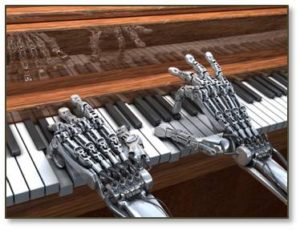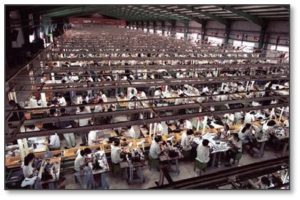 My posts on robotics and automation have generated a variety of comments, including a request from one reader that I give it a rest. Somehow, that feels like copping out. Why this sudden surge? Why now? Who will profit? Who will lose? How will it impact the economy? In the long run, is this good news or bad news?
My posts on robotics and automation have generated a variety of comments, including a request from one reader that I give it a rest. Somehow, that feels like copping out. Why this sudden surge? Why now? Who will profit? Who will lose? How will it impact the economy? In the long run, is this good news or bad news?
My crystal ball doesn’t always show clear pictures so I don’t have solid answers for these questions. The best I or anyone else can do is speculate on the possible ramifications of the robot army. So I offer these thoughts for contemplation—or argument.
Why the Surge in Robotics?
As I pointed out in a previous post, many robotic innovations are coming from Japan as a result of its demographic meltdown and cultural norms. An extremely low birth rate over decades has resulted in an aging workforce with too few young people to replace retiring workers as well as to care for the growing numbers of elderly. Culturally, Japan does not welcome foreign workers to fill the gaps as so many other countries do. As a result, they prefer mechanical replacements and are developing them almost by the day. If these robotic workers stayed within the borders of Japan, that would probably work out fine. Like a genie freed from its bottle, however, they are spreading to other nations and economies. The results? Let’s keep thinking.
Why So Many Robotic Innovations Now?
If demographics and culture drive Japan’s innovation, reducing labor costs motivates the adoption of robotics by other countries, including the United States. Reducing labor costs has so far driven waves of outsourcing, offshoring, mergers, acquisitions, computerization and layoffs.
 Companies find biological units to be more expensive, more emotional, less dependable, less efficient, and less predictable than machines. Being biological, we units have to do inconvenient things like eat, sleep, eliminate waste, care for homes, raise children, attend school sports, go to the doctor, etc. That means we can’t work 24 x 7 x 365 and keeping your production going on that schedule requires putting on multiple shifts—which puts three times the number of biological units on the workforce.
Companies find biological units to be more expensive, more emotional, less dependable, less efficient, and less predictable than machines. Being biological, we units have to do inconvenient things like eat, sleep, eliminate waste, care for homes, raise children, attend school sports, go to the doctor, etc. That means we can’t work 24 x 7 x 365 and keeping your production going on that schedule requires putting on multiple shifts—which puts three times the number of biological units on the workforce.
Robots, on the other hand, just keep chugging along. Once programmed and properly set up, they will work non-stop except for short maintenance breaks. They won’t complain about being mistreated because they have no awareness or emotions. Robots will do the same thing over and over without developing repetitive motion injuries like carpal tunnel syndrome. Mechanical workers won’t go out for smoke breaks or start work late because their car broke down. They won’t talk on the production line, rat out a manager’s misbehavior on social media, form a union or start a class-action lawsuit. Management finds this behavior ideal.
Who Will Gain from the Robot Army?
That’s easy: corporate C-level management, shareholders, the stock market, manufacturers of robots, and the companies that develop, ship, set up and maintain industrial robots. At least in the short term.
Who Will Lose?
That’s also easy: any worker whose job can be performed better and cheaper by a mechanical worker. Every day that fits an increasing number of jobs and the people that perform them. We have become accustomed to industrial robots replacing employees on the manufacturing production lines, kiosks replacing workers in airports, movie theaters, banks, and—coming soon to a location near you—fast food franchises.
 Drivers of trucks, buses, Uber/Lyft cars and taxis have begun sweating over driverless vehicles. If you don’t think a robot can do your job, just wait a while. If robots can beat a human at chess and Jeopardy, and write a song, they’re sneaking up on the kind of creative, white-collar, and intuitive jobs you probably think are immune.
Drivers of trucks, buses, Uber/Lyft cars and taxis have begun sweating over driverless vehicles. If you don’t think a robot can do your job, just wait a while. If robots can beat a human at chess and Jeopardy, and write a song, they’re sneaking up on the kind of creative, white-collar, and intuitive jobs you probably think are immune.
How Will It Impact the Economy?
Ah, here’s the rub. One group, which includes both me and fellow-blogger David Hunt, think that the robot army will have an overall negative impact both in the short term and the long run. Another group believes that new jobs will appear to absorb the jobless hordes that suddenly find themselves unemployable. While this may be a comforting thought, I find it unlikely, at least in the beginning. The field workers sidelined by agricultural robots in Simi Valley are unlikely to find work as robotic engineers in Silicon Valley.
 The SewBot can replace the myriad textile workers now laboring for pennies in the sweatshops of China, India, Bangladesh, Vietnam, and other countries. It could give companies the incentive to bring textile manufacturing back to the United States to reduce shipping costs and take advantage of more reliable utilities and infrastructure. On the other hand, this development would throw millions of subsistence laborers back into poverty without substantially increasing employment in this country. How many people actually work in a mechanized factory?
The SewBot can replace the myriad textile workers now laboring for pennies in the sweatshops of China, India, Bangladesh, Vietnam, and other countries. It could give companies the incentive to bring textile manufacturing back to the United States to reduce shipping costs and take advantage of more reliable utilities and infrastructure. On the other hand, this development would throw millions of subsistence laborers back into poverty without substantially increasing employment in this country. How many people actually work in a mechanized factory?
What Does the Robotic Future Hold?
Pessimists see hordes of destitute unemployed people with torches and pitchforks storming robotic factories and the homes of greedy industrialists. That could happen. Optimists see a utopian future in which no one has to work because machines do all the grunt labor. This also could happen, although it seems less likely. I see warehouses full of unsold goods and unneeded inventory. Because people without jobs have no money to buy the products that roll out of mechanized factories. Robot workers don’t need clothes or cars or food. They don’t use sporting goods, shoes, jewelry, furniture, appliances, or any of the goods on which our consumer economy depends.
In the short run, robots save money. In the long run, robots buy nothing.

Here’s a point I should’ve made regarding PC’s that I thought was implied, but allow me to make more straightforward: Although you’re absolutely correct to state that the advent of the PC increased productivity of us humans tremendously (to use an overused Trump term), it also made the components within them, namely the processors, and RAM, exceedingly cheap. What used to cost $1,000 to purchase, now costs about a buck, opening vast amounts of applications for them previously not economically viable. This helped spawn the increased automation we see so much of today (including of course, robots). Heck, I even have a processor in my coffemaker! The robot I worked on at Rethink Robotics has an Ethernet cable running up each arm with a 64-bit processor in every joint (both arms and head), and they sell a complete robot for $25k USD. This would be impossible without cheap processors and RAM chips. There are also tons of other industries that were impacted by the PC that I’m sure you’re aware of; The printing industry for one – when Adobe and the Mac made it cheap and easy to “do it yourself”, tons of these businesses closed, and thousands lost jobs in these areas, right? I’m sure you could think of many more if you wanted to, just like I could. Did that ever bother you? In this case it did for me as I worked part time for one and saw them collapse as they could no longer compete and maintain their staffing levels.
Yes,it did bother me, as I saw it happening, too. I used to cut rubylith designs back in the day so I know whereof you speak. I seem to remember there being lots of other jobs back then that people could move into.
I agree, but these events are more about technological advancement with the advent of the PC that we all use today, which I would submit have had a much larger impact than robots, at least up until now, and maybe even forever. The advent of the cheap processor, was the enabler for all of this, wouldn’t you agree? Globalization has had an impact also, but the cheap processor is where it all began and continues today from my perspective.
I don’t think I’m denying much of anything here, really. And, it’s not that you’re raising uncomfortable thoughts, as much as your concern appears to me to be a bit misplaced or perhaps even misguided (not by that much though).
Allow me a very poor analogy. When the advent of computers came upon us, did you or anyone mourn the loss of abacus manufacturers anymore? Or how about the companies that used to make slide rules? What happened to them, and did we ever care? So maybe they’re a much smaller scale example, but my point is that this has been happening everywhere, for decades, and not just with robotics, right?
So let me try to address at least one of your questions: ONE of the key reasons why robotics are appearing more often today, is that many of the required components, such as servomotors, processors and in particular sensors, have been largely commoditized over the last decade, and hence robots can now be had at marketable price points that today make sense for tons of industries (new or old).
An obtuse, inverse analogy to this might be that if the price of oil goes to around $50 a barrel or more, those drillers and fracking folks will go crazy doing more of it, but once it goes down to around $40 or less, the market dynamics no longer make sense to continue, and hence they stop and layoff droves of workers. Just like most any industry. That’s what a free market society does, for good or for bad.
The full explanation to address all of you’re wonderful writing is simply too complex for me to delve into much further. However, I’d love to sit down with either or both of you to hear more of what you think, and try to respond to more of what you’re delving into in a manner that I’m simply not capable of here. It’s a good topic!
The best I think I can say, is that I believe we can all agree that much of this will continue, as a natural course of events, as processors, intelligent software and technology in general continue to evolve. I think we all know they will – and jobs have been eliminated by machines since the industrial revolution, so I don’t think we’re turning back anytime soon (barring the apocalypse). Thus, to me, the question becomes, what should we as a “first world” society be doing about those being displaced by it all (and not just by robotics)? That’s the real question to be asking, no?
It’s true that robots don’t buy anything, however, besides helping to make goods cheaper, they have spawned new opportunities, including the creation of new jobs as you say – but your net negative view feels more subjective than objective and isn’t quite the whole story, as it is truly a complex one. Keep writing though, please!
Side Note: I enjoy and greatly appreciate you’re writings quite a bit, but some of what you mention perplexes me. Example; your mentioning of Japan – are these comments based on recent articles you’ve read, or are they more of your opinion from your years of experience in technology, or other? My background suggests that although Japan HAS been a key player (GE-FANUC, etc.) in this space, it hasn’t been so much anymore, at least not in the last decade, as loads of other players have entered the realm.
Mike: Your points are all well taken and I don’t disagree with any of them. I must make two distinctions, however. The advent of the computers largely made human workers more efficient. Granted, some people lost their jobs but the total, as David has pointed out, was small relative to the rest of the workforce. And jobs suited to their level of education, experience, etc. were plentiful. The robots that are being introduced now are designed to replace human workers, not make them more efficient or productive.
And the sheer number of people who will be cast into unemployment by mechanical devices is enormous. Sure, a lot of manufacturing jobs went away when robots took over the repetitive grunt work on assembly lines — and many of those people haven’t worked since. In fact, some of them are big Trump supporters because they feel strongly (and probably rightly) that their country has failed them. But that’s still a small number compared to the sheer volume of people who could hit the streets if the sweatshops of Southeast Asia become mechanized. Those garment industry jobs may be awful and pay a pittance but they keep families from starving. Where will the breadwinners in those families find work to replace them?
Also, we’re looking at jobs, like those of lawyers, nurses, caregivers, etc. that we have always considered the province of real people who can think, make critical decisions, innovate, create, and empathize. If robots take over those jobs, they will put people who have studied hard (and accumulated tuition debt) onto the unemployment lines. If getting a law degree means being replaced by a robot, why bother? Even more people will become angry that the contract they had to get an education and experience in return for a job has been broken. I have no doubt that this process will all continue but we won’t take action to help the displaced if we don’t first recognize the scope and depth of the problem that’s heading our way.
In regard to my comments on Japan, they come from reading about the country and its demographics as well as about the origin of some of the robots I’ve discussed in my posts on the Robot Chronicles. The drive to produce robots in Japan is very real for the two reasons I’ve mentioned. I didn’t make any of it up.
I’m glad you enjoy my writing and continue to be a regular reader (and commenter). Thanks for the good words.
I will opine that the “give it a rest” comment REALLY translates to “You (and by extension I) are raising uncomfortable thoughts with implications I really don’t want to have to consider.”
I agree. Denial is powerful.